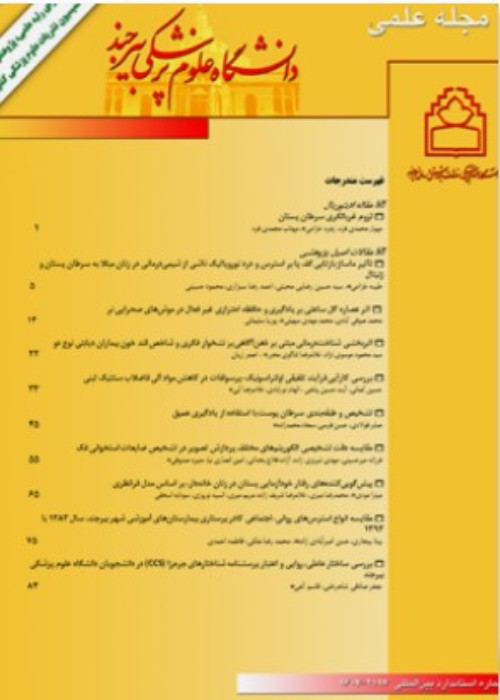Survey of observing educational rules and regulations by educational staff in different faculties of Birjand University of Medical Sciences
Abstract:
Background And Aim
Observing educational rules and regulations on the part of educational staff is obligatory because these rules facilitate different tasks such as students’ registration, taking credits, etc. Furthermore, it influences future personality development of students and is followed by the Ministry of Health as a factor in evaluating of Universities. The present study was designed to assess the observation of educational rules and regulations by educational staff in different faculties of Birjand University of Medical Sciences in 2006. Materials And Methods
In this descriptive- analytical research, 159 students (as educational informants) from three different faculties- medical, nursing, and paramedical -in Birjand University of Medical Sciences were studied by means of two checklists. Checklist 1 concerned obeying educational rules in all fields of study and all faculties and number 2 was about clinical stage. The obtained data was analyzed using 2 test and SPSS software and P<0.05 was taken as the significant level. Results
In this survey, checklist number 1 was completed for 159 students, of whom 63 cases (39.6%) were medical students, 51 (32.1%) nursing students and 45 (28.3%) were paramedical ones; and checklist number 2 was filled in for 81 students. 43.4 % cases had credit adding and dropping which had been done under relevant rules and certifying of their tutors. Of these students, 35.8 % had not signed their final credit verification forms; 74.6% of these students studied medicine, 13.7% nursing, and 6.7 % paramedical fields. Thus, the differences between the faculties were significant (P<0.001). Rules concerning temporarily transferring students had been observed in all the three faculties. 41.4 % of students in clinical stage said being an on-call intern was compulsory and 58.6% stated it as voluntary. 89.7% of students thought leaving the hospital was possible during leave-hour and the rest didnt answer this question. 84.5% of students approved the presence of an organized educational curriculum in clinical stage. 62.1% of students said rules of on-call substitution were not obeyed. Conclusion
According the obtained data signing of final credit verification forms, being on-call interns, and on-call substitutes must be emphasized more than before by educational staff so that promotion of observing educational rules and regulations would lead to qualitative and quantitative results in education and this would elevate the position of this university among the other medical universities in our country.Language:
Persian
Published:
Birjand University of Medical Sciences, Volume:16 Issue: 1, 2009
Page:
58
magiran.com/p639301
دانلود و مطالعه متن این مقاله با یکی از روشهای زیر امکان پذیر است:
اشتراک شخصی
با عضویت و پرداخت آنلاین حق اشتراک یکساله به مبلغ 1,390,000ريال میتوانید 70 عنوان مطلب دانلود کنید!
اشتراک سازمانی
به کتابخانه دانشگاه یا محل کار خود پیشنهاد کنید تا اشتراک سازمانی این پایگاه را برای دسترسی نامحدود همه کاربران به متن مطالب تهیه نمایند!
توجه!
- حق عضویت دریافتی صرف حمایت از نشریات عضو و نگهداری، تکمیل و توسعه مگیران میشود.
- پرداخت حق اشتراک و دانلود مقالات اجازه بازنشر آن در سایر رسانههای چاپی و دیجیتال را به کاربر نمیدهد.
In order to view content subscription is required
Personal subscription
Subscribe magiran.com for 70 € euros via PayPal and download 70 articles during a year.
Organization subscription
Please contact us to subscribe your university or library for unlimited access!


